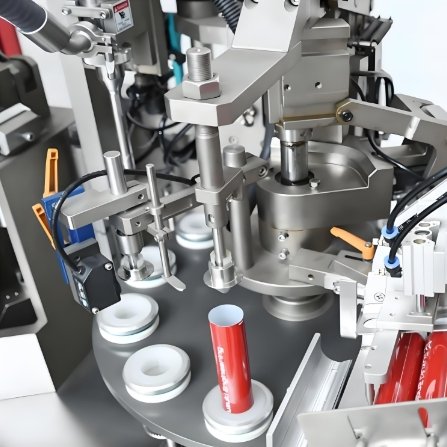
Operating a Tube Filling and Sealing Machine requires precision. Mistakes can slow production. They can also reduce
1. Incorrect Tube Positioning
Positioning tubes incorrectly causes problems. Misaligned tubes affect filling accuracy. It
Modern Automatic Filling Machines use sensors. They detect tube misplacement. Always rely on these features for error-free operation.
2. Using Incompatible Tube Materials
Not all machines handle every tube material. A Tube Filling and Sealing Machine must suit your specific tubes. For example, some machines handle only plastic tubes. Others work better with aluminum.
Using the wrong material leads to sealing issues. It can also damage the machine. Check compatibility before starting production.
3. Overlooking Maintenance
Skipping maintenance is a big mistake. Machines need regular cleaning. Residues can clog nozzles. This affects the filling process.
Lubricate moving parts as recommended. Worn-out components reduce efficiency. Regular servicing keeps your Automatic Filling Machine in top condition.
4. Ignoring Product Viscosity
Different products have different viscosities. A machine set for thin liquids may not handle thick creams. Always adjust settings to match your product type.
Modern machines handle various viscosities. However, improper adjustments still cause problems. Test settings before large-scale production.
5. Using the Wrong Seal Temperature
Sealing temperature matters. Low temperatures cause weak seals. High temperatures damage tubes.
A Tube Filling and Sealing Machine includes adjustable temperature controls. Calibrate them carefully. Check the tube material to determine the right settings.
6. Failure to Train Operators
Untrained operators make mistakes. They may not set up the machine correctly. Errors during operation can halt production.
Provide proper training. Teach operators how to use a Tube Filling and Sealing Machine . Make sure they understand its features and controls.
7. Overloading the Machine
Exceeding a machine’s capacity leads to breakdowns. Each Automatic Filling Machine has a maximum output. Overloading increases wear and tear.
Follow the manufacturer’s guidelines. Stick to recommended production limits. This improves machine lifespan.
8. Ignoring Safety Features
Modern machines come with safety features. Some operators disable them to save time. This is risky.
Safety features prevent accidents. They also protect the machine. Never bypass these systems during operation.
9. Neglecting Calibration
Calibration ensures accurate filling. Over time, settings may drift. This affects fill vo
Regularly calibrate your Automatic Filling Machine . Use sample runs to test accuracy. Consistent calibration avoids waste.
10. Using Low-Quality Tubes
Poor-quality tubes affect production. They may collapse during filling. They can also fail to seal properly.
Invest in high-quality tubes. Ensure they match the machine’s specifications. This reduces production errors.
11. Starting Without Testing
Launching production without testing is risky. Machines may have undetected issues. Product batches could be ruined.
Run a test batch first. Check for leaks, spills, or improper sealing. This step ensures smooth production.
12. Ignoring Environmental Factors
Room temperature and humidity affect sealing. Extreme conditions may weaken seals.
Keep production areas stable. Avoid direct sunlight or excessive moisture. A controlled environment ensures consistent results.
13. Skipping Software Updates
Modern Tube Filling and Sealing Machines use software. Updates improve performance. Ignoring updates causes compatibility issues.
Check for software updates regularly. Install them as recommended. This keeps the machine running smoothly.
14. Overlooking Safety Checks
Safety checks ensure security
Inspect the machine daily. Look for loose parts or damaged components. Regular checks protect operators and maintain production quality.
15. Using Incorrect Filling Heads
Filling heads must match the product. A wrong head affects accuracy. It may also damage the machine.
Choose the correct filling head for your product. Adjust it properly before starting production.
16. Poor Cleaning Practices
Dirty machines contaminate products. They also affect performance. Cleaning is essential after every p
Disassemble parts as needed. Use the right cleaning solutions. Ensure all components are dry before reassembly.
17. Rushing Production
Speeding up production causes errors. It may lead to improper filling or sealing. Machines have recommended speeds for a reason.
Stick to optimal speed settings. Consistency is more important than rushing.
18. Choosing the Wrong Machine
Not all machines suit every need. Some handle only specific product types. Others cat
Choose a machine that fits your requirements. Evaluate options carefully. Investing in the right Automatic Filling Machine ensures long-term success.
19. Ignoring Noise or Vibrations
Unusual noises or vibrations indicate problems. Ignoring them worsens the issue.
Stop the machine immediately. Inspect it for damage. Address issues promptly to avoid costly repairs.
20. Overlooking Documentation
Every machine comes with a manual. Ignoring it leads to mistakes. The manual contains vital information.
Read the manual thoroughly. Follow its instructions
Avoiding these mistakes ensures smooth operation. A well-maintained Tube Filling and Sealing Machine boosts productivity. Proper training and regular checks prevent errors. Choosing the right Automatic Filling Machine makes a big difference.
